- Huyett Marketing Department
- 06/01/2023
- Updated 09/05/2024
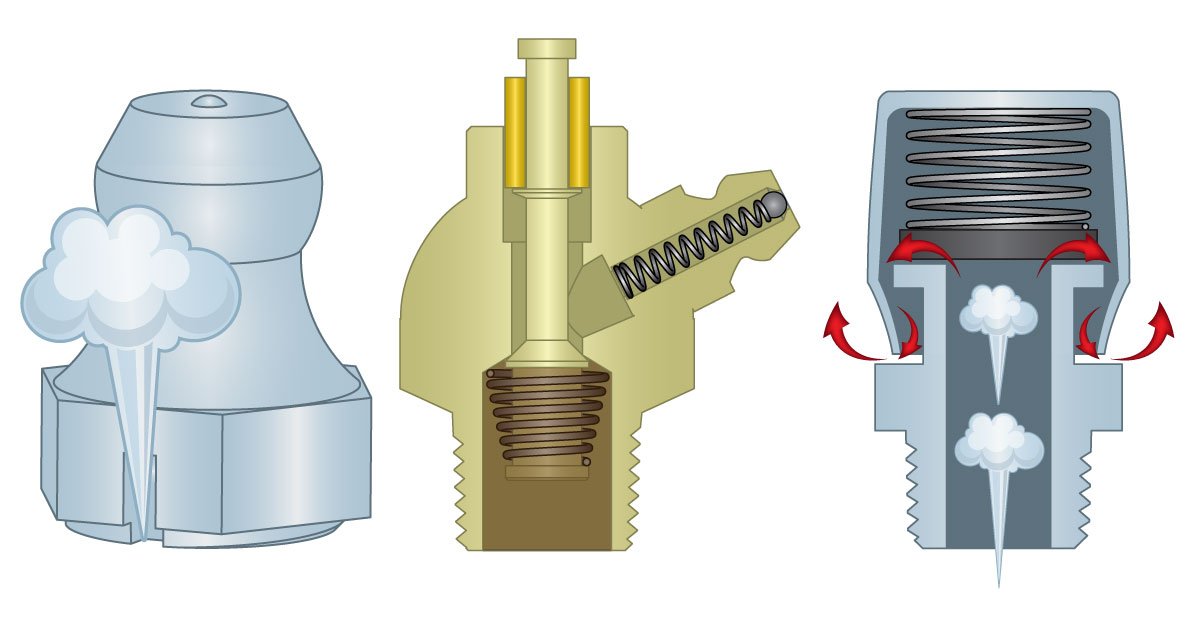
High-pressure grease fittings – also known as
pressure control grease fittings, pressure relief grease fittings, or high-pressure zerk fittings – prevent damage to applications by ensuring that pressure never exceeds a predetermined maximum. These applications function best when their internal pressure is within a range determined by their design and construction. During operation, gases and lubricants expand as temperatures rise, which may cause pressure to increase beyond the desired range. Regreasing may also cause it to rise, since grease guns deliver grease at a high pressure.
If the pressure exceeds the predetermined threshold, parts may wear more quickly, high pressure churning may reduce efficiency, seals may break, and the life of the component may be reduced. High-pressure grease fittings extend the life of machinery and equipment.
What are High-Pressure Grease Fittings?
High-pressure grease fittings (or zerk fittings) refer to a group of pressure-relieving components that maintain internal pressures in a lubrication application. If pressure increases beyond the threshold, the fitting manages gases and lubricants until the desired operating pressure is re-established.
Here's the catch - not all of them are actually zerk fittings. The term
high-pressure grease fittings
is an umbrella term that encompasses two types:
- Flow control grease fittings accept grease and maintain its flow.
- Pressure control fittings only regulate pressure.
The following table offers a high-level overview of the types of fittings that fit into each category. More specific information is given in the sections below the table.
HIGH-PRESSURE GREASE FITTINGS QUICK GUIDE
| ||
|---|---|---|
FLOW CONTROL GREASE FITTINGS
Fittings that both accept grease and manage the flow
| ||
 | Features a milled slot in the shank to expel grease and release pressure
| |
 | Allows for extra grease with its malleable ball check design to accommodate extra pressure
| |
 | Similar to standard leakproof fittings but designed for lower psi applications
| |
 | Regulates how much grease goes
into
the zerk, not how much flows
out
| |
PRESSURE CONTROL FITTINGS
Fittings that only regulate pressure
| ||
|---|---|---|
 | Opens and closes within a predetermined range with a rubber seal
| |
 | Features ports that allow air to move in and out
| |
 | Similar to a vent fitting but features a spring that controls the pop-up valve
| |
Flow Control Grease Fittings
Flow control fittings are technically a type of grease fitting; they accept grease and offer added pressure relief mechanisms by controlling its flow through safety vents and leak proof or flow stop technology.
Before using these components, make sure to verify the proper pressure rating for your application and ensure they coincide with the capacity of the fitting. Leak proof and flow stop fittings will provide specific maximum pressures; safety vents will simply expel grease when it overflows.
Safety Vents
Safety vents have a milled slot in the shank to relieve air or grease during operation. It is inexpensive and simple in design; the part excretes excess grease through the slot into the work area when the application is over-pressurized. A safety vent's main disadvantage is that it contaminates the work area with the grease overflow.
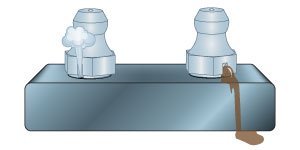
Leakproof Fittings
Leakproof fittings actually allow for extra pressure by accommodating added grease. They feature a plastic, rubber, or brass-seated steel ball check that deforms to create extra space for more lubrication. It also features a seal so that grease cannot leak out when under pressure.
The leak proof design is desirable in environments where grease should not contaminate the work surface; they are often found in food processing or pharmaceutical applications.
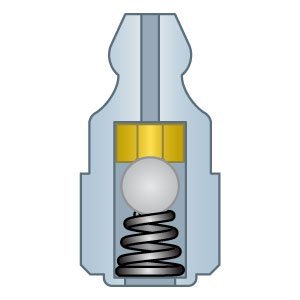
Light Oil Leakproof Fittings
Like their standard counterpart,
light oil leakproof fittings accommodate additional lubrication but are meant for lower psi environments with light oil. Except for a plastic ball check that can deform on the inside of the tip when under pressure, they are designed the same as regular zerk fittings. The deformation provides a leak proof seal for up to 215 psi.
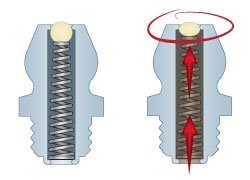
Flow Stop™ Fittings
While leakproof fittings control the grease that flows out,
flow-stop fittings control the
input
. Using a valve with a pressure rated spring, the fitting opens and closes to allow grease to flow in a controlled manner, which prevents a grease gun from over-greasing the application.
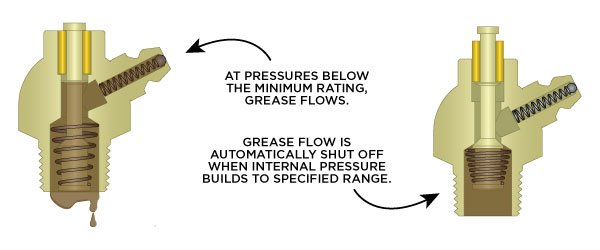
How to Install Flow Control Grease Fittings
Since flow control fittings are zerk fittings, they are installed and greased in the same manner as other zerks. Read our
How to Install and Maintain Grease Fittings guide to learn more.
Pressure Control Grease Fittings
Pressure control grease fittings are not actually zerks because they do not accept grease from a grease gun. Their sole purpose is to regulate air and gas in a lubrication application, which they do using three distinct design types: vents, breathers, and relief vents.
Vent Fittings
Vent fittings open and close within a predetermined pressure range: as internal pressures rise, a flat seal in the vent (typically composed of rubber) opens, allowing air to vent. As it decreases, the seal closes. The rubber seal has the added advantage of sealing the port opening while closed, preventing dirt, water, and other contaminants from entering.
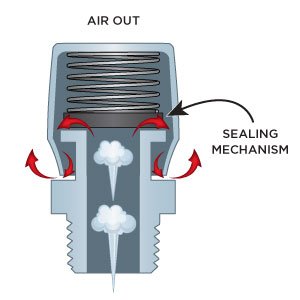
Breather Fittings
Breather fittings feature specially designed ports that allow air to move in and out, creating the effect of "breathing." They have a special cap which reduces contamination. For additional contamination protection, some breathers are equipped with a felt filter.
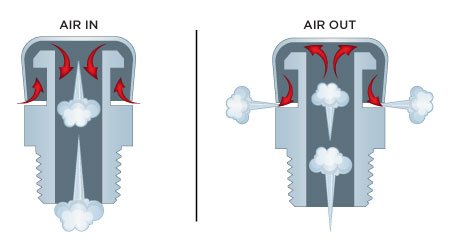
Relief Vent Fittings
Relief vent fittings open and close within a predetermined pressure range. As internal pressure rises, the plunger or check ball opens, allowing air to vent. As it decreases to below the minimum threshold, the closes. These are available in both a top vent and side vent design.
The basic design consists of a pre-engineered spring that controls a pop-up valve. At peak performance, the valve is closed, sealing the bearing. Once internal pressures reach the predetermined opening psi, the pop-up valve engages and allows air to escape.
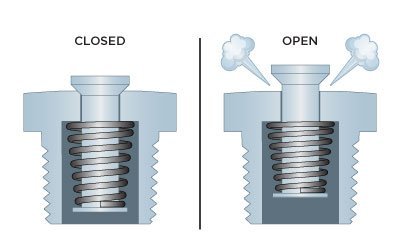
How to Install Pressure Control Grease Fittings
Pressure control fittings are typically installed above the stationary fluid line so that they reduce pressure by venting gasses. If they are fitted below the fluid line, they may vent grease instead.
These components are available in a wide range of pressure ratings to suit many environments. Be sure to have the proper fitting with the correct pressure rating for the application. If a fitting with the wrong rating is installed, venting may not occur before efficiency is affected and components are damaged.
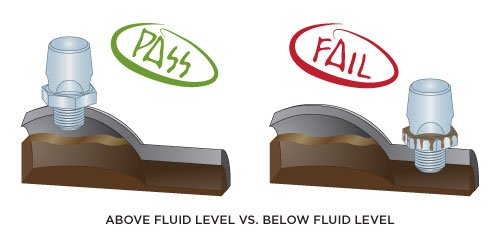
Other Lubrication System Components
There are many other
grease fittings and lubrication accessories that make up a full hydraulics system in relevant applications. While not all are necessary in every system, the following list encompasses a range of options so you can choose which ones will work best for you:
- Other types of grease fittings provide unique benefits that help you navigate everything from standard machinery to high-volume and/or high-motion applications, settings with awkward angles, and restoration projects.
- Huyett’s lubrication systems & accessories category offers oil-compatible parts, grease fitting adapters, caps, and header blocks so you can provide lubrication in a wide range of settings.
- Grease guns, couplers, and hoses work together to actually disperse the grease from the gun to the fitting, while tools and parts provide different installation tools and replacement components.
The Bottom Line
Huyett offers a variety of high-pressure grease fittings from flow control to pressure control to help you keep your lubrication application within safe operating pressure ranges. To learn more about our lubrication fittings and accessories, visit our
Product FAQ page or
contact our Sales team today.

